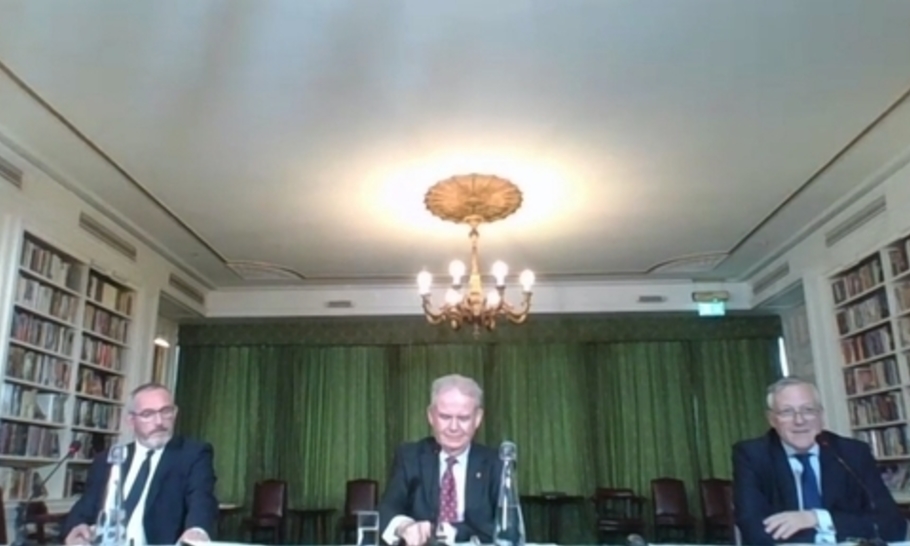The Russia Report is no excuse to politicise the security services

House of Commons/PA Wire/PA Images
The Russia Report has, quite rightly, made waves that go beyond the intelligence community. There is genuine cause for concern in the gravamen of the report: that the security services have reacted too slowly to the threats posed by hostile states, in particular Russia’s meddling in our democratic process. But scrutinising our spooks is what the Intelligence and Security Committee (ISC) exists to do. Agencies that cost us £3 billion a year should be held to account by MPs, who naturally draw as much attention to themselves as possible for doing their job. None of this is out of the ordinary.
The Prime Minister’s mistake was to sit on this document for far too long, thereby turning its publication into a much bigger event than it needed to be. Indeed, so many months have elapsed while the report did the rounds of Whitehall, being redacted as it went, that in the meantime a general election took place. The ISC’s chairman and driving force behind the report, Dominic Grieve, lost his seat. As the new chairman, Julian Lewis, had played no part in the report, he gave pride of place at the launch to two Opposition MPs, both with axes to grind.
Naturally, they made the most of their moment in the limelight. Stewart Hosie (SNP) and Kevin Jones (Labour) were scathing about the Conservative Government, especially Boris Johnson, and played up what the report’s authors call “a hot potato”: Russia’s role in Brexit. Not only had MI5 failed to find out whether the Russians had interfered in the 2016 referendum, but the Government had not even asked them to do so. At the time, Islamic State and other terrorists posed a much more immediate threat to British security. Proving a negative is notoriously difficult; in this case, almost impossible. In the past four years, Brexit has been debated ad nauseam. There is, of course, no consensus about its causes and consequences. But the chance that Russian interference — if any — was decisive in the result is vanishingly small. It simply did not warrant a major diversion of MI5’s scarce resources.
Not that this bothered Messrs Hosie and Jones in the slightest. They are politicians, after all, and this whole exercise is, for them, political. The raison d’être of the Scottish National Party is to break up the United Kingdom; not all of us relish being lectured about threats to national security by an MP whose party threatens national integrity. As for the Labour Party: its leader at the time when this report was compiled was Jeremy Corbyn. From the Kremlin’s point of view, it is hard to imagine a more useful idiot, to use Lenin’s terminology. Yet Labour under Corbyn lost two general elections, the second by a landslide. If British democracy were really dominated by Russian influence, wouldn’t it have been exerted last December on poor old Corbyn’s behalf?
Actually it was: at one of the Boris and Jeremy TV debates, the latter produced a document with a flourish for which he made all kinds of extravagant claims. We now know that this US-UK trade document had been indirectly fed to the gullible Labour leader by Russian intelligence. One imagines those responsible for this coup de main being grilled by Vladimir Putin. “Did it affect the outcome, comrades?” Nyet, Mr President. “British voters were not fooled?” Nyet, Mr President. “Then why should we spend billions of roubles on them? Focus instead on our national interests: gathering intelligence (including scientific research) and using Londongrad to launder money. Oh, and don’t forget to go after all our traitors there.”
Now that the Russia Report is out, the British intelligence community has let it be known that it is “receptive” to the idea of devoting more resources to protecting the democratic process against Russia. So the ISC is pushing at an open door. What would not be helpful, however, would be an official inquiry. Inevitably, such an investigation would have to be conducted behind closed doors. The much-vaunted Mueller investigation is not a good precedent and in any case, American intelligence agencies are political in a way that their British counterparts have never been. Mike Pompeo, the US Secretary of State who was in London this week, is a former Director of the CIA. So was the late George Bush Snr. It is simply inconceivable that a former head of MI6 could become Prime Minister.
The demarcation between politics and security is a precious part of the British system. Sacking the Director-General of MI5, Ken McCallum — who has only been in office since April — would achieve nothing, except to advance the politicisation of the service he heads. A measured, detailed response by ministers and security chiefs to the Russia Report is appropriate. But this political document, written by politicians, is no excuse to politicise the security services.





